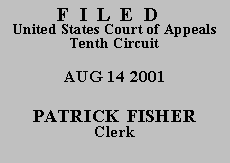

|
BENNY PAUL McCARTNEY, |
|
Before HENRY, BRISCOE, and MURPHY, Circuit Judges.
These consolidated appeals are before the court on Benny McCartney's request for a certificate of appealability. McCartney seeks a COA so that he can appeal the district court's denial of his § 2254 habeas corpus petition. See 28 U.S.C. § 2253(c)(1)(A) (providing that no appeal may be taken from the denial of a § 2254 habeas petition unless the petitioner first obtains a COA). Because McCartney has not "made a substantial showing of the denial of a constitutional right," this court denies his request for a COA and dismisses the appeals. See id. § 2253(c)(2).
Following a jury trial, McCartney was convicted in Oklahoma state court on one count of possession of marijuana and one count of possession of a controlled, dangerous substance. He was sentenced to five years' imprisonment and a fine of $3000 on each count. On direct appeal to the Oklahoma Court of Criminal Appeals ("OCCA"), McCartney asserted the following three claims: (1) the trial court denied him his Fourteenth Amendment right to due process by imposing a fine in addition to a sentence of imprisonment; (2) the arresting officers violated the Fourth Amendment when they used a drug dog to sniff the exterior of McCartney's car; and (3) his counsel was constitutionally ineffective in failing to move to suppress the drugs seized from the vehicle. Despite the fact that McCartney had not raised the Fourth Amendment claim before the trial court, the OCCA considered and rejected all three claims on the merits in a summary opinion. In particular, the OCCA held that the trial court was specifically empowered by state law to impose a fine in addition to the terms of imprisonment, a dog sniff of the exterior of a car did not constitute a search, and counsel was not ineffective in failing to bring a motion to suppress because such a motion would have failed as a matter of law.
After exhausting his state court remedies, McCartney filed the instant § 2254 habeas corpus petition raising the same three issues that he had raised on direct appeal to the OCCA. The district court referred McCartney's petition to a magistrate judge for initial proceedings pursuant to 28 U.S.C. § 636(b)(1). The magistrate judge began by noting that McCartney would be entitled to habeas relief only if he could establish that the opinion of the OCCA rejecting his claims was "contrary to, or involved an unreasonable application of, clearly established Federal law, as determined by the Supreme Court of the United States." 28 U.S.C. § 2254(d)(1). Applying those standards, as elucidated in the Supreme Court's recent decision in Williams v. Taylor, 529 U.S. 362, 402-13 (2000), the magistrate judge concluded that McCartney's first and third claims failed on the merits and that habeas review of his Fourth Amendment claim was barred by Stone v. Powell, 428 U.S. 465 (1976). Upon de novo review of the magistrate judge's report and recommendation and McCartney's objections thereto, the district court adopted the report and recommendation and denied McCartney's § 2254 habeas petition.
As noted above, McCartney must obtain a COA before he can appeal the district court's denial of his § 2254 habeas petition. See 28 U.S.C. § 2253(c)(1)(A). McCartney is entitled to a COA only upon making a "substantial showing of the denial of a constitutional right." Id. § 2253(c)(2). He can make this showing by demonstrating that the issues raised are debatable among jurists, a court could resolve the issues differently, or that the questions presented deserve further proceedings. See Slack v. McDaniel, 529 U.S. 473, 483 (2000). This court has reviewed McCartney's request for a COA and accompanying brief, along with the magistrate judge's report and recommendation, the district court's order, and the entire record on appeal. That close review reveals that the district court's resolution of McCartney's petition is not debatable, subject to an alternate resolution, or deserving of further proceedings. Accordingly, this court GRANTS McCartney's request to proceed on appeal in forma pauperis and DENIES his request for a COA for substantially those reasons set forth in the magistrate judge's report and recommendation dated February 8, 2001, and the district court's order dated April 2, 2001. McCartney's appeal is, therefore, DISMISSED. See 28 U.S.C. § 2253(c).
ENTERED FOR THE COURT
Michael R. Murphy
Circuit Judge
*. This order and judgment is not binding precedent, except under the doctrines of law of the case, res judicata and collateral estoppel. The court generally disfavors the citation of orders and judgments; nevertheless, an order and judgment may be cited under the terms and conditions of 10th Cir. R. 36.3.